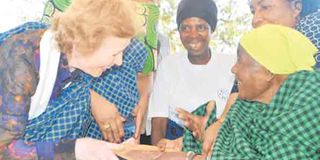Fight child marriage, Graca urges Tanzanians

What you need to know:
Former South African First Lady Graca Machel and former Irish President Mary Robinson, who are in the country to campaign for universal health coverage, made the appeal on Thursday
Dodoma. Early marriage–also known as child marriage–must be fought at all costs because of the negative effects the union has on women and girls, Tanzanians have been urged.
Former South African First Lady Graca Machel and former Irish President Mary Robinson, who are in the country to campaign for universal health coverage, made the appeal on Thursday.
Speaking in Mpamantwa Village in Bahi District, Dodoma Region, Ms Machel said although Tanzania, under President John Magufuli had made big strides in development, more still needs to be done in the protection of girls’ rights.
Ms Machel, widow of freedom fighter and first president of post-Apartheid South Africa, Nelson Mandela, said many girls were denied the right to pursue their education goals due to early marriage.
“We must put an end to this very disappointing reality,” said Ms Machel as she inspected maternal health services at the village.
Without giving statistics, she said many girls were forced out of school due to these unions.
“There is a need for concerted efforts by all stakeholders including government, leaders and citizens towards ending child marriages,” said Ms Machel.
According to Girlsnotbrides organisation, Tanzania has one of the highest child marriage prevalence rates in the world. Almost two out of five girls in Tanzania are married before their 18th birthday.
According to the organisation, child marriage is particularly prevalent in rural areas where children get married as early as 11 years old.
Some girls are forced to get married young to generate an income, in the form of dowry, which can in turn be used by their brothers to get a wife.
Human Rights Watch has highlighted that the Tanzanian government’s primary education final examinations, which determine pupils who may continue with further education, exposes girls to child marriage. Adolescent girls are sometimes forced to marry after failing the exam, whilst mandatory pregnancy tests and expelling pregnant and married girls from school also violates girls’ rights.
In 2016, the High Court issued a landmark ruling that outlawed and directed the repeal of Sections 13 and 17 of the Marriage Act, 1971 that recognised teenage marriages. Msichana initiative, an NGO advocating for girls rights founder Rebecca Gyumi filed a constitutional petition to challenge the provisions.
The Act in question allows customary marriages, recognises 14-year-old brides while parents’ consent is enough to marry off those aged from 15.
A few months after the ruling, the government filed a notice of appeal against the Court decision. However, the government is yet to appeal.
Speaking about universal health coverage the two former leaders underscored the need for the government to increase investment in the sector in order to make sure that many citizens had access to health services.
“I acknowledge efforts made by President John Magufuli in making sure that Tanzania achieves its development targets but much is needed to be done when it comes to ensuring Tanzania attains universal health coverage,” said Ms Machel.
Speaking during the tour Ms Robinson reiterated the need for Tanzanians to enroll in health insurance schemes.
For her part, Health minister Ummy Mwalimu insisted that the government will continue to address various challenges that her portifolio faces. She admitted that most Tanzanians were yet to subscribe to health insurance schemes.
Ms Mwalimu said only 28 per cent of Tanzanians have already been registred.
However, she said through various initiatives, which have been set by the government, 75 per cent of Tanzanians will be registered by 2025.
Addressing a rally in Chato recently President Magufuli said the country’s medicine and medical supplies budget has been raised from Sh31 billion in 2015/16 to Sh251 billion in 2017/18.
In April 2001, the African Union countries met and pledged to set a target of allocating at least 15 per cent of their annual budget to improve the health sector and urged donor countries to scale up support.




